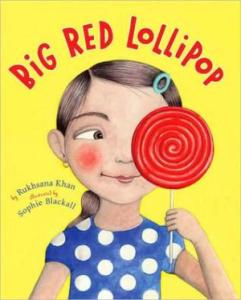Maybe she was just hangry.

The main character is the oldest of three sisters. She's invited to a birthday party, but the middle sister overhears and demands to go too. Since the mother isn't familiar with birthday parties, she makes her take the sister. They both get loot bags with a big red lollipop. The younger sister eats hers on the way home. The older saves hers and fantasizes about eating it, only to find the younger stole and ate it. When she angrily chases her sister, the mother shames her and tells her she should share.
The older sister doesn't get invited to parties again because the other girls know she'd have to bring her sister, who acted like a spoiled brat at the first one. Then the middle sister gets invited to a birthday party of her own, and the very youngest overhears and demands to go. The mother explains that it's fair because the oldest had to take the middle, but the oldest overcomes her desire for revenge and speaks up on her behalf. The middle girl goes to the party alone, and then gives her a green lollipop that she got at the party, and afterwards the two oldest girls are friends.
It's got a good, realistic, message in that the main character forgoes revenge and gets rewarded with friendship, but the mother's refusal to listen to the eldest when she tries to speak up for herself, only paying attention when she defends the middle child, is grating. It smacks of favoritism, and that isn't helped by the middle child's spoiled behavior regarding the first party and lollipop stealing. Kids, especially siblings, can seem mean and demanding, and when they see an older child getting more rewards, they don't understand the experience and increase in responsibility that merit those rewards. And young children are very motivated by instant gratification. But parents need to be a voice of reason, and curtail the behavior of the youngest children when it encroaches on the rights and happiness of the elder, just as they would tell the older child to stop pushing over the youngest when the youngest is learning to walk and much smaller. And parents also need to understand that children are often better judges of the attitudes of their peers than parents, especially when cultural differences are involved. I hope I never act like the mother in this book.